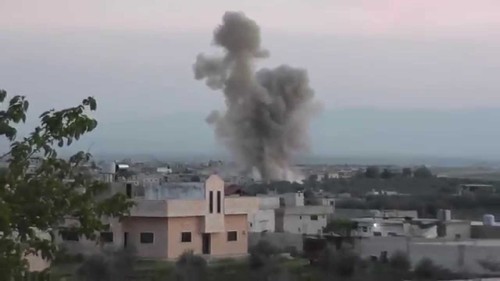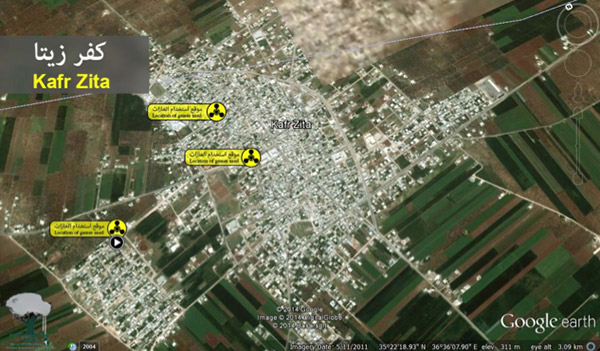The Violations Documentation Center, one of the most reliable sources for information from Syria, considers claims of a chemical weapons attack on Kafrzita in Hama Province last weekend:
Kafrzita in rural Hama, 30 km from Hama city, was exposed to airstrikes by explosive barrels on Friday 11th April 2014 — the fall of three barrels was reported at 6:00 pm and another two at 11:00 pm.
See Chemical Warfare — Regime Uses Chlorine Gas on Kafrzita in Hama Province
The first three barrels were loaded with chemical and toxic gases ,according to Dr. Hasan al-A’araj, the Director of Health Department in Hama, whom VDC contacted via Skype on Saturday morning. He stated the following:
On Friday, at about 6:00 pm, a helicopter dropped several barrels on Kafrzita, specifically on the western part of it. One of those barrels was so huge that it resulted in a massive explosion with yellow fumes, after which ambulances rushed to the place where the several casualties, estimated by a hundred, were suffering unprecedented symptoms including suffocation, dry cough, bloody cough, foamy saliva and vomiting.
The casualties were moved to the hospital, where they received first aid. Their injuries ranges between minor, medium and serious ones. They were all treated using sprays, anti-vomiting medicines and breathing apparatus to give them bronchodilators and cortisone.
Consequently, 95% of the casualties got better except for five serious ones, three of whom were transferred to the hospitals north of Syria due to their need for pulmotors, while the other two were treated in the field hospital and got better the other day.
When asked about the nature of the gas causing these casualties and the air conditions when this gas was used, the doctor answered:
The gas smells very much like chlorine, which resembles the cleaning substance used in houses. The weather was cool and a little bit windy, which made the smell disappear at a 500-meter distance away from the place of the explosion.
He added, “We do not have any tools to help us determine the nature of the gas. However, we took samples of blood and urine from the casualties most affected by this gas.”
Regarding the numbers of casualties, the doctor continued:
No one died because of the gas as a direct reason, yet, we documented an unidentified girl whose head was injured as a result of the attack. We also believe that the gas was the reason for the deterioration of her case leading then to her death. Mustafa Ahmad al-Muhammad, about 70 years old from Morek, also died as a result of a head injury.
It is worth mentioning that most of the casualties were displaced from the nearby Morek city.
Video and Footage
VDC has contacted the media activist Abu Mahdi al-Hamwi, who was at the city and shot several videos showing one of the explosive barrels which was loaded with chemical and toxic gas. These are the specific locations:
Additionally, he has shot two videos and taken a number of photos inside the field hospital in Kafer Zeta showing great numbers of casualties, including women and children.
The Military Situation
VDC has also contacted one of the dissident colonels from the regime’s army in Kafrzita, who preferred to remain anonymous for some security reasons. He informed us about the military situation as well as the development of the military operations in the town, which preceded the use of toxic gases.
Every day Kafrzita is witnessing about 20 air raids whether by the regime warplanes, which attack the city with missiles, or by the helicopters, which drop explosive barrels. However, not all of the air raids resulted in bombing, as the warplanes take off from Hama Military Airport.
On Friday, a violent attack by the regime forces against the neighboring town Morek was repulsed. Then, two tanks and a PMP wagon were damaged and many of the fighters were killed. This led to the use of the chemical weapons on the part of the regime as an endeavour to compensate for the operation, knowing that all the points shelled with explosive barrels were civilian.
Also, Kafrzita is about 6 km away from the nearest line of confrontation between the FSA (Free Syrian Army) and the regular army, which led to multiple injuries due to the use of gas, most of whom were civilians. Five soldiers only were among the one hundred injuries. VDC in Syria has documented the death of 19 people in Kafer Zeta since the beginning of this year, who died as a result of explosive barrels shelling by the regime forces.
The explosive barrels loaded with chemical and toxic gas were used for the second time on the next day, when the city was shelled by four explosive barrels, some of which carried toxic and chemical gases, which led to similar symptoms suffered by dozens of the city residents. The shelling targeted the eastern part of the city according to eyewitnesses.
Activists have shot footage of two barrels after their fall, one of which has not exploded (see photos). It has been loaded with the gases that caused the injuries.
The trademark NORINCO — which is a Chinese company that manufactures machinery, chemicals, explosives and blast materials, civil and military firearms and ammunition, etc. — is clear on the barrel. This picture shows the chemical symbol of chlorine gas — CL2.
Assessment
The above-mentioned testimonies, photographs, and videos from the field hospital strongly indicate the possibility of the use of weapons that are likely to be of chemical nature by the Syrian regime within the internal armed conflict in Syria.
If proven by the Special Commission of Inquiry, this can be considered a war crime and a violation to Geneva Protocol 1925 that prevents the use of asphyxiating and poisonous gases during the war, as well as a breach of the commitments of the Syrian regime, which joined the Treaty for the Prohibition of Chemical Weapons on October 14, 2013. Article I/b of this treaty provides “Each State Party to this Convention undertakes never under any circumstances to use chemical weapons.”
This attack marks a new way by which the Syrian regime uses chemical toxic substances, via explosive barrels dropped by helicopters.
Call to Action
We call on the OPCW (Organization for the Prohibition of Chemical Weapons) to send a specialized mission to the locations in question to open an immediate investigation on the nature of the gas used in this attack, in order to hold those who gave orders for it fully responsible, and to visit the field hospital where the casualties were treated.
Although highly credible sources of information at the beginning of 2014 referred to the use of chemical weapons by the regime forces in Darayya, OPCW and the Inquiry Commission carried out no investigation about those allegations.
We repeat the call on all concerned international parties:
First, the United Nations Mission Investigating Chemical Weapons Use in Syria headed by Professor. Ake Sellstrom
To immediately visit the location in question to take samples from it.
Second, the Organization for the Prohibition of Chemical Weapons
To open an immediate investigation on this attack and consider the possibility of a breach of a member state of its obligations.
Third, the (United Nations) Security Council
To hold an immediate meeting to issue a decree to force the Syrian regime to allow the Inquiry Commission access to Kafrzita in Hama, to open an immediate investigation, and to stop the air and land bombardment against the city in order to prevent the destruction of evidence in the attacks, in addition to referring the Syrian file to the International Criminal Court.


